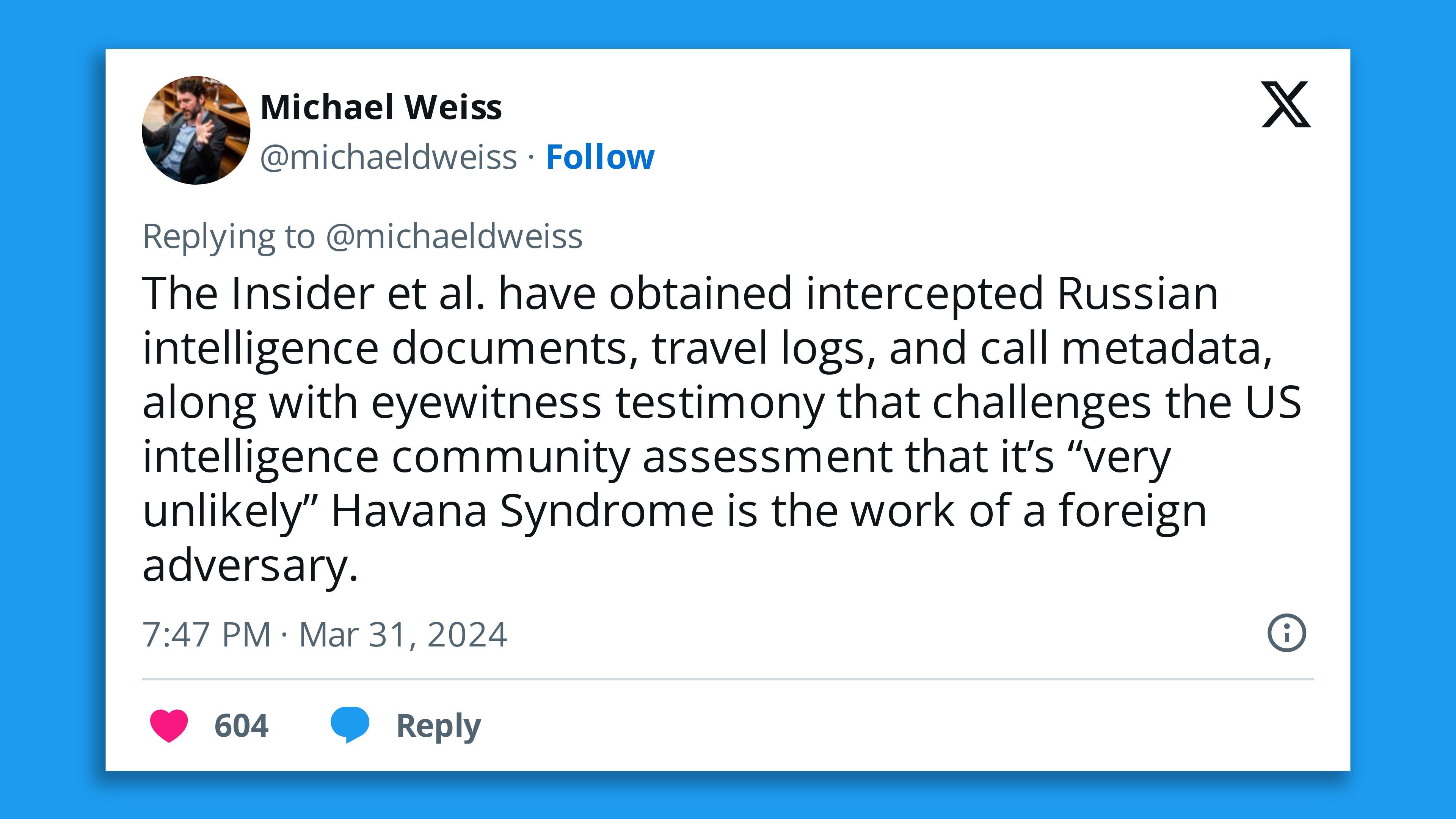
CBS' Scott Pelley with an FBI agent identified only as "Carrie," who told "60 Minutes" in the show broadcast Sunday that she's experienced symptoms of "Havana syndrome." Photo: CBS News/"60 Minutes"
A joint media investigation into "Havana syndrome," a mysterious health condition that's affected U.S. diplomats and government officials, has found evidence that a Russian military assassination unit may be responsible.
Why it matters: "60 Minutes" noted that the findings from its five-year probe with The Insider and Der Spiegel that Russia's GRU Unit 29155 may be behind the neurological symptoms marked the first evidence linking a foreign adversary to the cases.
- U.S. intelligence agencies have said it's unlikely a foreign adversary is responsible for the phenomenon.
The big picture: Symptoms of "Havana syndrome," which U.S. officials refer to as "anomalous health incidents" (AHI), can include extreme headaches, dizziness, nausea and ear pain.
- The condition was dubbed "Havana syndrome" because reports of American officials falling ill were first documented at the U.S. Embassy in Cuba's capital in late 2016.
Yes, but: New evidence suggests "there were likely attacks two years earlier in Frankfurt, Germany, when a U.S. government employee stationed at the consulate there was knocked unconscious by something akin to a strong energy beam," per The Insider.
- "The victim was later diagnosed with a traumatic brain injury, and was also able to identify a Geneva-based Unit 29155 operative," the Russia-focused news outlet added Sunday.

Zoom in: Greg Edgreen, a recently retired Army lieutenant colonel who ran the Defense Intelligence Agency investigation into "Havana syndrome" from 2021 to 2023, told CBS' Scott Pelley it's his opinion that the U.S. is being attacked by Vladimir Putin's regime.
- Edgreen noted the top 5%-10% of performing officers across the agency had been impacted.
- "And consistently there was a Russia nexus," said Edgreen, speaking publicly for the first time on the matter in Sunday's "60 Minutes." "There was some angle where they had worked against Russia, focused on Russia, and done extremely well."
Mark Zaid, an attorney with security clearance representing more than two dozen clients with Havana syndrome symptoms, including from the FBI, CIA and State Department, said there's evidence of a government "cover up" involving "lines of inquiry that would take us potentially to answers we don't want to have to deal with."
- He told Pelley a thread that's common among affected FBI personnel was that "most if not all of my clients other than the family members connected to the employee ... were all doing something relating to Russia."
The intrigue: Two major National Institutes of Health studies out this month examining the conditions of over 80 government employees and family members who experienced "anomalous health incidents" in locations including the U.S., Cuba, China and Austria found no consistent evidence of brain injury.
- David Relman, a Stanford University scientist who's led previous research into the condition, took issue with the findings of the studies, published in the Journal of the American Medical Association, in an accompanying editorial.
- He noted two previous studies he was involved in "found the cases with abrupt-onset, location-dependent sensory phenomena to be unlike any disorder reported in the neurological or general medical literature, and potentially caused by an external mechanism."
What they're saying: When asked for comment, representatives for the Office of the Director of National Intelligence directed Axios to the portion of the Annual Threat Assessment, published in February, which addresses AHI.
- That states that the office is closely examining AHI and notes that most intelligence "agencies have concluded that it is very unlikely a foreign adversary is responsible" for the condition.
- The agencies "have varying confidence levels because we still have gaps given the challenges collecting on foreign adversaries," the report notes.
- Russian officials had yet to comment on the reports, and representatives for the FBI, White House and State Department did not immediately respond to Axios' requests for comment.
Editor's note: This article has been updated with new details throughout.
